Basics
Home and SearchSite Guide
Brentford Basics
Privacy Policy
Contact
People
FamiliesPhotos of people
Name indexes incl WW1
Memories
Lists, Documents, News
Occupations
Properties
Properties: High StreetProperties: non-High Street
Photos
Maps
1909/10 Valuation Index
Pub Hub
Can You Help?
Seeking...Mystery photos
Roads Off
A-Z listJanet's Research
HistoryBeach's Jam
Nowell Parr
Turner the Artist
Queen Victoria 1840
Brentford Market
80 High Street
Clitherow of Boston House
Four Croxford Brothers
Sources & More
They SaidBooks etc.
Web Links
Next
Site Technology
Author
Home and Search
Not Brentford
Terry Burke's Memories of life in Brentford from the 1930s to the postwar era
This is an account Terry's early life; he has also prepared a companion document that provides more context about the times - a good read if you are interested in the cost of living, housing, working conditions and entertainments of the times. It also includes sections on the old coinage and weights and measures - and much more!To George and Ellen, a son
BIRTHSTo George and Ellen (Nellie) (née Smith) Burke, a son, Terence Edmund, 9lbs.9ozs. at 4.30 a.m. at Cleyponds Maternity Hospital
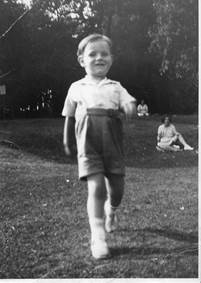 This advertisement did not appear in The Times, The Daily Telegraph, The Tatler or the Brentford and Chiswick Times because it would have cost £1 in the first three publications or 7/6d in the B&C Times. Mum and Dad could not afford it. A Telegram was sent to my maternal grandparents informing them of my arrival, safe in the knowledge that Grandpa Smith would walk up the road, round the corner to tell Grandma Burke. Cost 1/-.
This advertisement did not appear in The Times, The Daily Telegraph, The Tatler or the Brentford and Chiswick Times because it would have cost £1 in the first three publications or 7/6d in the B&C Times. Mum and Dad could not afford it. A Telegram was sent to my maternal grandparents informing them of my arrival, safe in the knowledge that Grandpa Smith would walk up the road, round the corner to tell Grandma Burke. Cost 1/-.
My parents were quiet, undemonstrative, simply nice people without an ounce of malice in them. They saw the best in everyone. Not terribly well educated in a formal sense they were imbued with common sense and decency. They were kind and generous and cared for other people who never put themselves first. Often I wish they had, but I’m not as nice as they were.
Brentford, when I born into it on the 30th August 1934, was a small historic town by-passed by the 20th century. It had been important, in a quiet way, since Caesar crossed the River Thames here; during the Civil War a couple of battles between the Royalists and Parliamentarians were fought here and until the canals, railways and motor cars came it was a staging post on the great road to the West from London .
It had held county and national elections; was the site of the Middlesex Assizes; was the County Town and a busy port when the Grand Junction (later Union) Canal was opened, linking the Midlands and industrial North to London by water. It thrived with scores of businesses lining its narrow High Street and river front. There were pubs and inns galore, over fifty in the mile between the Brentford and Kew Bridges. People came from miles around to shop and go to its market.
Royalty and the Aristocracy passed through, often stopping. King George 1V was thrown from his carriage when it became stuck in the mud of his own Highway! Within a short distance were several great houses with their extensive parks which provided jobs as gardeners of varying rank and many domestic servants.
My Brentford
But this wasn’t my Brentford. My Brentford was just old. There were squalid slums; the air reeked with smoke from tannery and soap factories, breweries and the gas works. The streets were grimy, the High Street was choked with traffic and often ankle deep in hay and chaff and manure or **** emitted by the hundreds of horses. There were (still are) rows of Victorian workmen’s cottages built without pretty basic amenities – there were no bathrooms, the lavatories were outside, gardens were too small to grow enough food for a family and although the average household consisted of four or five people, three of whom were still to grow up, they generally only had two bedrooms.
On the bright side however, there were numerous council schools, plenty of churches, a health centre, open spaces and a modern cottage hospital. It also had a pretty good football team.
The 1930s were a time of economic depression. Times were very hard. Wages, where there were any, were low and millions of men had no income. For those in work during the 1930s the average wage was less than £200 per annum. In a working class town like Brentford life was very hard and for many was cold, uncomfortable and not very nice.
My father was a skilled tradesman who lost his job in the Great Depression. No one in London or the South of England wanted shipbuilders or repairers. Boilermakers? No thanks. He was fortunate in having a brother-in-law who had a job as a van driver for one of London’s large department stores. Uncle Bill got my Dad a job in the shop’s warehouse at £2/10/0 a week. It meant leaving home at 7a.m., riding his bike for seven miles, leaving work at 6p.m and riding seven miles home again whatever the weather, usually into the wind.
My mother, with two small children, my sister aged nine and me, brought us up in a flat in Brook Road South where, for a period, she also provided accommodation for her brother.
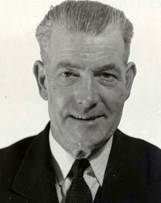 |
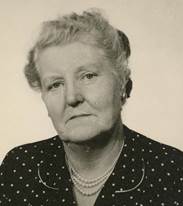 |
Mum & Dad
Six weeks after I was born, my father broke his leg while playing football for the works team. As a young man he had been a semi-professional footballer for Southampton, but had been unable to make a career in football because, as the eldest of a family of seven with a widowed mother, he had to remain at home supporting the family until his younger brothers were able to shoulder some of the responsibility. His chance of playing for Aston Villa (who wanted to buy him from the Saints) was gone.
Having broken his leg he was unable to work. There was no sickness pay, although he received a single payment of about 21/0 (a guinea) and 10/0d (ten bob) a week for a month from the league’s insurers. So my mother had to find a job in days when few married women did work outside the home.
She found a job cleaning for a lower middle class lady in Isleworth about three miles away. Putting me in the pram she pushed me there and back five days a week for a pittance, but that was better than nothing. It was, I suppose, fortunate that my father when better didn’t come home for dinner (mid-day), but she still had to shop, do the laundry and ironing, keep the house, cook and bring up a baby (me) and a nine-year old.
A little later she got an early morning office cleaning job with Fdk. Coyle and Co. builders, in Brentford High Street , nearer home and better paid. I also went there in the pram. (The site has a 1940s photo of Frederick Coyle's premises)
While working at Coyles she learnt that a house in Braemar Road with two bedrooms was becoming available and enquired about the tenancy. Mr Coyle, who both appreciated my Mum’s work and liked her, put in a word of recommendation to the Landlord’s agents, Bradshaw Brown & Co. in Hounslow and we moved in in March 1939. She lived there until she died in 1976.
During the period in Brook Road, friends of my parents moved from Brook Road to Hounslow where they bought a new three bedroomed house with a bathroom, bay-window and good sized garden for about £450.00. Mum thought they might be able to afford one too, just, but her father, who had been out of work throughout the 1930s advised against taking a mortgage – a mill-stone- he called it because in his eyes no job was secure. Notwithstanding, Mum arranged to go with Dad to see it one evening after work. It was a 2d bus ride away. Dad arrived home tired and wet through to the skin. It was blowing a gale and having been on his feet all day and after a seven mile bike ride after a day’s work, it was just too much. He felt he wouldn’t be able to manage the ten miles each way the new house would mean, especially in winter, and so they never bought it.
In 1950 the landlord’s agents put the whole row of houses in, Braemar Road 32 of them, on the market for £300 each. So few tenants wanted to take up the offer the agents decided not to break up the terrace when they could sell them as job lot as an investment. In the mid-1960s they came on the market again, but this time for £3,000. As Dad was 68 years old and a mortgage out of the question it was not possible to buy it. Currently, as I write this, the house next door is on the market at £550,000 – half a million pounds! It is still only a ‘2-up, 3 down plus a bathroom’ house, although it now has a ‘courtyard’ instead of a backyard or garden. Really?
At the age of about three, I caught Scarlet Fever, then a not uncommon illness for small children. I was taken in a blue (contagious diseases) ambulance to Cleyponds Isolation hospital. I recall being wrapped in a red blanket and carried off by an ambulance man, with our GP, Dr Moore, standing with his arm on Mum’s shoulder on the doorstep. I was in hospital for about three weeks with no visitors at all. The only thing I can remember is that another child in the ward (so much for being isolated) said I had to have something called an ‘operation’ but what that was, no one knew. One suggestion was that you had to drink a glass of hot water, and that thought stayed with me for many years.
Cleyponds was in fact the maternity hospital where I was born – whether it had changed into the Isolation hospital or whether it was simply another part, I never found out – probably because I wasn’t interested. I believe the buildings are still there, just off of Ealing Road, half-way to South Ealing underground station. I still don’t know whether I was born in Ealing, London W 5 or Brentford, Middlesex. I think the boundary ran, maybe still does, through the hospital.
The Bluebird School
Soon after that illness I started school at the Bluebird School in the grounds of what was then Brentford Senior School . My sister Eileen had to take me to school as she was at the senior school and Bluebird was in the girls’ half of the school grounds. She hated having to take me, or more especially, bringing me home rather than sloping off down the ‘Rec’ with her friends.
On my first day at school I became aware of two things that remain with me to this day. One is that Marigold flowers have sticky stems, because I fell into a flowerbed full of them; and the smell and taste of semi-warm milk. On a warm sunny September morning, the air in the classroom smelled of chalk dust, one could see dust motes in the sunbeams, and the milk, which may have been cold when it was delivered by Evan’s Dairy at 8 o’clock but wasn’t when we got to drink it, through a straw, from 1/3 pint bottles at 10.30. Ugh!
Arriving home at dinner time – 12.o’clock- we still lived in Brook Road, I ran up the stairs to the flat excitedly to tell my Mum all about school …….. and was violently sick as she opened the door. But I loved school and have fond memories of Mrs White and Miss Pooley. With Mum’s help and their interest I learnt to read and write and love books very quickly.
One Saturday afternoon before starting at the Bluebird, Mum took me on the 655 trolley bus from Brentford Half Acre to Hanwell Broadway. We went on top in front seats into a new world. Tree lined roads, a large park, modern shops. We went to a boys’ outfitters where I was fitted with a school uniform; short grey trousers, a blue and silver snake buckled belt, a blue and silvery/grey quartered cap and long grey socks with blue and silver bands at the top. I was grown up – I was a real schoolboy.
I suppose I spent eighteen months or so at the Bluebird before moving on to Ealing Road Junior School. On Sunday September 3rd the Second World War was declared and I was 5 years, 5 days old. I recall hearing Mr Chamberlain’s solemn tones on our new wireless and then being carried out to the front step by my Dad. All our neighbours seemed to be on their front steps as well and the first air raid siren went. Everyone looked up, watched the skies and listened. Could we hear German bombers? Nothing happened but everyone looked very serious. Then the ‘all-clear’ siren sounded and life continued as normal.
TopAir raids shelters, bombs...
It was probably a day or two later, perhaps on Tuesday September 5th Mum took me to Ealing Road Junior School. We went in through the Boys entrance, not Girls and Infants. There, waiting to greet me was Mrs White from the Bluebird School. She was to be my class teacher. What a relief because my sister who had also been at Ealing Road had filled me with horror stories about the old dragon of a head mistress, Mrs Hennig , and two nasty men teachers, Mr Sutton and Mr Greenslade. In the event Mrs Hennig was a darling, very strict but very kind and Mr Greenslade (an elderly man) a very good teacher, who never forgot we were little boys. I never encountered Mr Sutton who had retired. Football (played with an old tennis ball) was banned in the playground but Mr G joined in in the area between the air-raid shelters and later took us Carville Hall Park for proper football practice for an hour or so one afternoon a week.On the way to Carville Hall we passed St Georges School. We considered them ruffians. On the way along the Great West Road we passed a modern looking factory, with a large blank front wall painted a sort of ochre colour and with small round windows, from which emanated a most peculiar smell. I never found out what it was, which company it was or what they made. On the opposite side of the road from this mystery building was the tallest building around for many miles. This was the Simmonds Aero Accessories skyscraper (about 9 storeys high), later the Head Office of Beechams, which later became Smith Kline Beecham and is now known as GSK the giant pharmaceutical company. One afternoon, while in the school playground, an RAF Hawker Hurricane fighter plane circled the tower at about 200 feet; the cockpit canopy was open and the pilot waved down to us. From then on we favoured Hurricanes over Spitfires.
For a small boy living seven miles from the Empire’s Capital City, the war was a fascinating time. I was not evacuated when many, if not most of London’s children were moved into the countryside and safer areas. I believe we were on the fringe of the designated area and I recall my mother saying that my sister and I would not go. If anything was to happen to us, she said, ‘we would all be killed together’. We nearly were.
Our gardens were too small for Anderson air raid shelters and our rooms too small for Morrison indoor shelters, so four brick communal shelters were built in Braemar Road, one with its entrance almost directly in front of our house. Every night during the Blitz we went out into the shelter with our neighbours. Initially there was nothing in them but free standing backless benches along the wall to sit on. Mum and Dad put two of them together to make a bed for me while my mother and Eileen made do on chairs from our house. The only facility was a chemical toilet (a galvanised bucket with a lavatory seat loosely positioned on top) behind a sacking curtain. The only lights were candles. We went to the lavatory (loo is a much more modern word, unknown to us) indoors. I was supposed to go to sleep on the benches wrapped in blankets but seldom did so. It was more interesting to listen to the bombers overhead and bombs as they fell. The brick shelters were reasonably substantial but would not have saved any one inside from a direct hit, although they were effective in minimising the lethal effects of blast and shrapnel fragments. Dad was an official fire-watcher and patrolled the street outside, coming in occasionally for a cup of cocoa. We spent many nights in the shelter, typically from around 9pm until 4 in the morning.
We heard bombs falling (they whistled on the way down) and the thump as they hit and exploded. Some fell on surrounding streets and on one night one came down and hit the kitchens of numbers 21 and 22. We lived in number 18. No one heard the whistle (it was said that you never heard the one with your name on it) but there was an almighty bang. The bomb didn’t explode, although the shock wave broke many windows, the shelter shook and I fell between the two benches to the floor. Miraculously, no one was hurt although the grown-ups were visibly shocked. We were all terribly frightened.
With a 2000kg (2 ton) high explosive unexploded bomb three doors away the whole street was evacuated while the Bomb Disposal Club dealt with it. We went to stay with friends in Hounslow. It took the bomb squad 10 days to get it out. They were unable to de-fuse it and eventually got it onto a lorry and took it to Syon Park to deal with it. Sadly it blew up as they were taking it off the lorry killing the soldiers. We were returning to our friend’s house (next to the one we nearly bought) and were on a bridge over the railway when it went off. I recall seeing the flash, hearing the explosion and feeling the blast although we were more than a mile away.
There were lighter moments in the shelter though. On one occasion the sound of an exploding bomb not too far away was followed by a hissing sound, probably a water main had been hit, but one elderly neighbour, Mr Goodrich, panicked and began screaming that the Gas Works had been hit and the noise was escaping gas rushing towards us. His panic might have spread but my Dad, with a nod towards his chum Stan Gent, hit the old man squarely on the chin with a left hook (for younger readers that is a punch to the jaw). He knocked him cold, Stan Gent caught him, laid him on bench and told his wife to get the old boy a cup of tea. He came quickly round. Crisis over.
TopRelatives, neighbours and family friends
Our immediate neighbours were Mr and Mrs Hancock, Fred and Beat(rice) at No.19. At No. 17 Mr & Mrs Austin and I have no idea of their Christian names. Fred and Beat had two children, more my sister’s age than mine. Young Fred was drafted into the Navy when the war began and was quickly captured by a German surface raider somewhere off Norway. He was a prisoner of war until the war ended and although his parents knew he was safe, had no word from him for 5 years. I can’t remember much about the daughter Sheila. The Hancocks were gregarious, funny, common (in my Mum’s eyes) but good neighbours. They bought a 9 inch television set around 1950 and for three years we went in to their house on cup final day to watch the match.Mr and Mrs Austin were quite the reverse, quite refined my Mum thought, but they kept themselves very much to themselves and we seldom saw or heard them. I occasionally played with their granddaughter in the road outside. She shocked me when, I guess, we were both 8 or 9 years old when she suddenly threw her skirt up, showing her white knickers and told me that because I was a boy I was different, and if I showed her my difference she would show me hers. I was far too shy and ran indoors, probably bright red. I don’t think I ever saw her again and it was years before I found out what she was talking about.
A fair proportion of the men living in Braemar Road worked in the Gas Light and Coke Company’s plant in the High Street. As employees they received a discount on their gas, used for cooking and lighting. I don’t think anyone had hot water except from a kettle or saucepan. As a result we were among the first residents to have electricity in the house, Mum having arranged it with the builders/agents before we moved in.
My Mum had an aunt living in the road, Nora Mancy, a widow but a real game old girl whom it was always good to visit, for biscuits or sweets. She had a lodger/companion, Mrs Hart who could not read. I always wondered how, when she went out, she knew which bus to get on if she didn’t know where it was going.
Particular friends of my parents were Mr and Mrs Gent, Stan and Nellie. Stan was a signalman for the Great Western Railway. They had 3 children, Eileen, Olive and Les. Les was a year or two older than me, Eileen was my sister’s age with Olive in between. Les and I were great pals and roamed all over the place together. Opposite lived Mr and Mrs LeFort and their daughter Gladys; next door to them lived George and Ethel Joyce who had a baby about the same time as my sister and they became great friends. Ethel died a year ago aged 100. George, a long distance lorry driver took me on a few journeys with him during my school holidays. With him I learned which were good transport cafes and which were not. I gained an appreciation of Greasy Spoon breakfasts, bacon, black pudding, eggs, fried bread, (never baked beans, I don’t like them) and strong tea. A list of residents of Braemar Road from the period is at the foot of this article.
V1s and V2s
Towards the end of the war, Britain began to suffer from a far more deadly aerial attack from Nazi Germany. ‘V’ (vengeance) bombs, initially V1s, or Doodle Bugs, pilotless rocket engine planes that, when the engine cut out, went into a dive and exploded on impact with the ground. You could both hear and see them coming but when the engine cut and you could see which way it was falling, you ran for shelter or stood there watching and wondering who was going to cop it next. They killed many people, not, fortunately in Brentford. The RAF eventually found a way of forcing them down into unpopulated areas such as farmland in Kent, Sussex and Surrey but they were dangerous.The V2 rockets were far more lethal. As they were supersonic there was no warning. Brentford and Chiswick suffered from a number of them. One hit the Coty Cosmetics factory on the Great West Road about a mile away, killing a lot of workers. When it happened I was in school, morning assembly, there was an almighty ‘thump’, the ceiling in the Hall cracked and some whitewash and plaster came down, we all, standing in lines, rocked a bit, but no one, as far as I know screamed or cried. Mrs Hennig told Mrs White at the piano to continue playing a hymn and we were marched out, in our classes to the air raid shelters in the playground.
I don’t recall being sent home, no one had a telephone, most parents were at work and basically we were alright. Shaken but not stirred. It was exciting. The school did not suffer any serious structural damage. As far as I recall school went on.
During my five war time years at Ealing Road Junior, only one boy was killed by enemy action. Richard, I can’t recall his surname, was staying with his grandparents somewhere in rural Buckinghamshire when a high explosive bomb, believed to have been dropped by a stray German bomber lost on its way home after a raid on Birmingham and jettisoned the bomb to lighten the load A very unfortunate co-incidence.
Prior to these V weapons, I was ‘sent’ to Devon. Not evacuated exactly, although it probably seemed like it. During the Blitz, Dad fell through the roof of the Bluebird School while extinguishing an incendiary bomb fire while firefighting and spent three weeks in hospital. Shortly after this my Mum was taken ill, I know not what with, and spent thirteen weeks in hospital. Sister Eileen, aged about 14 looked after Dad and me. For our summer holidays we had been going with our neighbours Mr & Mrs Gent to Dawlish for a couple of years. It was decided it would be a good thing for Mum to stay on for a while to aid her recovery, keeping me with her. When she returned home I stayed in Dawlish and in September started school there, staying with ‘Aunt’ Rose and ‘Uncle’ Tom Woodley. Thatched cottage, no indoor water, Loo/Privvy at the top of the garden. I had a lovely time there, but came home at Christmas to get ready to take the Scholarship exam for grammar school in the Spring.
I passed.
TopMy academic career was not a success...
The next five years of my life were (and I choose my words carefully) affected by the 1944 Education (The Butler) Act. This provided free grammar school education for children over 11 years of age, the first time in history that such education was free. So, having passed the Scholarship (now 11+) I started at Chiswick County Grammar School for Boys in September 1946. If that Act had not been passed it is quite possible I could not have gone to Chiswick County as I doubt if Dad could have afforded the modest fees. But it was free and I went. The downside was the school uniform; blazer, cap, tie, socks were only available from Harrods. And they were rubbish. Being maroon and blue the dye ran and all my white shirts soon had pink stains under the arms.Getting to school was easy, Southern Railway from Brentford to Chiswick (Grove Park) on the 8.51. School started at 9.15 in Burlington Lane, a five minute saunter from the station. The train was already quite busy when it called at Brentford with boys from Hounslow, Whitton and Isleworth already on board. Why they didn’t go to Spring Grove Grammar in Isleworth I don’t know. The school also had pupils from as far away as Ruislip, Eastcote and South Harrow who came by Piccadilly Line to Chiswick and then a bus from Chiswick High Road.
At school we were divided into three ‘forms’, 2D, 2K and 2M. Allegedly the K stood for ChiswicK or Kew, the D for BrentforD, and the M for Mixed, an indication, of sorts, of where we lived. All forms above the 2nd were conventionally labelled A, B and C according to academic ability.
During my 5 years at Chiswick, having started in 2D, I progressed to 3B and managed to stay in the B stream all the way through. Clever enough never to be in danger of relegation but smart enough (as I thought then) to avoid promotion to where I would have had to work harder. I managed to stay somewhere close to top, but in no danger. In 2D our Form Master was Mr Waite (Leery, or Light Weight as opposed to Heavy Weight who taught English to the 5th and 6th forms) Leery Waite also taught English.
My academic career was not a success. Teaching was, with hindsight, well below par. The masters were old and tired after 5 years of war, several were past retirement age and many were poor teachers. They provided facts, but no education and took very little personal interest in us. With one or two exceptions it was easy to hoodwink them about homework and classroom exercises. On one occasion after the end of year exams, the Deputy Head, ‘Bill’ Dutton realised the aggregate marks for 5B didn’t tally. We had by-passed the Physics paper.
School ‘outings’ were few and far between. I can recall only two. Once we were marched a couple of miles, in the rain, to Hammersmith Broadway to the Gaumont cinema to see Shakespeare’s Henry V, Laurence Olivier’s masterpiece. No one told us why. It was a thoroughly boring afternoon, but at least it was not school. Such is the effect it had on me that I recall it as a Black and White film. Instead I have since learned that it was one of Britain’s first technicolour films, and was the definitive performance by the world’s greatest actor. Yawn! Yawn!
The second outing was to the Ford Motor factory at Dagenham. We had the doubtful pleasure of our Form Master (Geoff) Last in charge. On arrival at the factory, probably a coachload, 40 to 50 pupils, we were divided into small groups of 10 or so and allocated a factory guide. Mr Last attached himself to my group. From department to department he criticised the company, its vehicles, its production methods, just about everything. The guide eventually got fed up and refused to take us any further and left us in the canteen to wait for the others who had the whole tour.
Later, we discovered that Mr. Last was a Communist (someone followed him home one day and saw a Communist candidate’s poster for a forthcoming election in his window). Hence his view of the capitalist Ford Motor company. It was a great shame as Ford were beginning to introduce new, post war models, quite different from their all black Anglia’s etc. Consuls and Zephyrs looked American, the world was changing, but our schoolmasters weren’t.
Our teaching of Shakespeare was limited to constant readings of Julius Caesar, as that was the ‘book’ for our GCE while the only poem we were exposed to was ‘Christabel’ by Samuel Taylor Coleridge, for the same reason. To me, they were just words in a stupid, boring play and a poem that didn’t rhyme very well. For neither was there any explanation nor a suggestion of what these masterpieces were about or that we should look for one. Christabel however was looked forward to because it mentioned a bosom. I still can’t understand nor read poetry and am still struggling to come to terms with William S of Stratford.
Of mathematics, oh dear. One of our Form Masters was one Ritchie, aka ‘Scroff’. (He suffered badly from Dandruff and wearing an academic gown ………) His lessons consisted of mathematical problems chalked on to the board which we were expected to solve. Geometry was OK, as was straightforward arithmetic but algebra, with no explanation of equations! Hopeless. In Physics in one year we had three different teachers (and no exam).
No music was ever played in a music lesson, there was never a reference to any composers, artists, no musical scores and no attempt to teach us how to read music or play an instrument. I don’t think the school had any instruments anyway, except a piano. If you could sing more or less in tune then you could be in the Choir. I was, but told not to sing in a Christmas concert, just to stand there and open my mouth. Similarly Art. The Art Master was a renowned RA. George Ayling. Our lessons consisted of looking at an object and then drawing or painting it. No gallery visits (Hogarth’s House was just down the road) and it wasn’t until sometime later I realised Hogarth was a painter. There were no art books, no looking at paintings, nothing. Mr Ayling carried on with his own, probably commissioned, work.
In English there was some attempt to encourage writing, although there was more emphasis on grammar. This was taught diagrammatically without much explanation. Once, in writing an essay I misplaced or omitted an apostrophe. Without explanation I was punished by having to write the word apostrophe 50 times, after school.
We had no advice or help in the art of taking exams. I thought I could do alright with GCE, based on my past performance in the B stream with reasonable reports in all subjects, but it was not to be. I obtained just four passes (the pass mark was 51%, with no grades), in English Language, English Literature, History and Arithmetic (not Maths). It appeared I ‘failed’ Geography and Economics because I wrote too much and didn’t answer all the questions – in both I later understood I gained very good marks for the questions I had answered in both subjects, but not enough to pass. I also did well in ‘French Oral’ but again failed to answer all the written questions.
I decided I wanted to join the Ordnance Survey and become a Surveyor and cartographer as I had long had an interest in travel, geography and maps – and still have. I applied to the OS for an application form and was invited to take the OS Exam. There was no career advice at school, which totally ignored my request for help in finding out what was involved. On taking the exam I had no idea about technical drawing, knew very little about compasses, taking bearings etc. and naturally did not pass. My career was over.
Chiswick County was fun though, although perhaps it would have been better for me if I had been made to work harder or shown the benefits that could accrue from a good education. Allegedly I had been a ‘bright’ child, quick, intuitive and thought intelligent, but I was lazy. I could grasp a concept, see where it was going and gave the impression of understanding. It was quite easy. My parents had no idea of what was really required of me at school and I played on it. I was good at sport, having a natural aptitude for ball games and made it into the appropriate school and House teams. I was reasonably popular, although inclined to talk too much (a fault I still have) and being tall I was noticeable. I was a Form Captain at some point; I joined the School Scout Troop, 17th Chiswick, but fell foul of a bully of a Troop Leader who was bigger and stronger than me. It wasn’t worth fighting for and the Scout Master was not the right sort of person to look up to. At football I usually played in goal and on the cricket field kept wicket. When possible I liked to open the batting.
TopHome - a very pleasant, happy place
Home was a very pleasant, happy place. From 1939 until 1945 there was a war on, and was seldom very far away, only a few thousand feet above our heads, life must have been very hard and worrying for my loving parents but seldom was a cross word heard. They were hard working, not terribly well off and, one has to say, not terribly well educated either. My father left school at 15 in 1913 and was apprenticed for 5 years into a shipbuilding yard as a would-be riveter. His father had died just a few weeks before leaving his mother a widow with 7 young children to bring up. My mother had gone into Service aged 14 as a house maid in a country house in the New Forest in Hampshire. Shades of Upstairs, Downstairs and Downton Abbey.After his apprenticeship and as a fully qualified tradesman in 1919 my Dad lost his job because no one wanted ships anymore. Unemployment was rife as ex-serviceman came back from France looking for non-existent jobs. Not for the next 20 years, until the beginning of World War 11 in 1939 did he find regular employment in his trade. This experience, allied to that of my maternal grandfather, also a skilled tradesman, coloured the family’s view of the world and affected my career and future. Grandpa Smith had been made redundant from the company for which he had worked for 40 years and never worked again until he died.
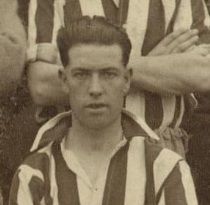 Dad was good at football and signed semi-professional terms with Southampton FC. He made a few first team appearances and, so the story goes, made an impression such that the mighty Aston Villa made enquiries about signing him as a full time player. However, as the eldest son with six siblings and a widowed mother to look after, he could not move to Birmingham. Footballers then only earned about £5 a week during the season and £2 during the close season. Youngsters even even less.
Dad was good at football and signed semi-professional terms with Southampton FC. He made a few first team appearances and, so the story goes, made an impression such that the mighty Aston Villa made enquiries about signing him as a full time player. However, as the eldest son with six siblings and a widowed mother to look after, he could not move to Birmingham. Footballers then only earned about £5 a week during the season and £2 during the close season. Youngsters even even less.
With the coming of war, and my Mum already working as a cleaner, following Dad’s broken leg, Dad was asked via his Trade Union (The Boilermakers) to take a job with the Thames Steam Tug and Lighterage Company on Smith Hill/Brentford Ait on the river. This increased his wages from his job as a parcel packer in a London Department store.
Mum was required to register and do ‘war-work’ which she did in the Smith’s crisp factory on the Great West Road, I think during the afternoon. My sister meanwhile got a job at the Sperry Gyroscope factory also on the Great West Road. This undoubtedly improved the family finances and I was never aware that we were hard up. The Grammar school fees would have been difficult though.
The war, for me was great. Unaware of danger, never hungry, lots of freedom while my parents were so busy.
Effectively, for much of the time I was at Ealing Road Junior I was a ‘latch-key kid. Although I came home from school for ‘dinner’ when Mum was working at Smith’s Crisps as her war-work, during the afternoons there was no one at home when I got home from school at 4 o’clock and let myself in, using a key sort of securely hidden. I might have a piece of bread and jam or a jam tart. After that I either went down the Rec – the recreation ground at the bottom of Grosvenor Road near St Pauls school, or play football (with a tennis ball) or cricket in the summer in Braemar Road. There was no traffic, just the very occasional van. We used the air raid shelter walls for goals, or chalked stumps on the wickets in the summer. There were usually eight or ten boys, a few from Braemar Road, especially the Sturgess brothers, Alf and David, Dennis Ford, maybe Geoff Green and Les Gent plus lads from the other side of Ealing Road. As we got older we might go off to Carville Hall or even Boston Manor Park (crossing the Great West Road, Brentford’s 1920/30s by-pass – now superseded by the M4 Motorway).
Quite often we only came home when it got dark or the park keepers threw us out. During part of the war, during the summer, Britain was on Double British Summertime which meant that in April and October the clocks were adjusted by 2 hours instead of the 1 hour change nowadays. As a result it didn’t get dark in July and August until after 10 at night. We also made nuisances of ourselves ‘helping’ Dad’s Army. The local Home Guard platoon practised in the woods of Gunnersbury and Boston Manor parks. One lot attacking, the others defending. We tried to creep from one to the other to tell them what the others were doing and where they were. Great fun (for us!).
I used the free Carnegie Library at the junction of Clifden and Boston Roads a great deal; the children’s library was a beautiful room with fantastic woodwork and fittings, a very pleasant place to be. I attended the Clifden Road Methodist Sunday School on Sunday afternoons, which gave Mum and Dad some time to themselves, a rare treat and respite for them to be together. Sunday School also had a Boys Club on a Monday evening, although I never really took to it as I didn’t like the ‘leader’, a chap of some 18 or 20 who always wanted to teach us how to wrestle, which to me was quite abhorrent. I simply hated being touched. Also it hurt when he threw us to the floor and dropped on top of us. The Sunday school had super summer outings though. Initially on the 667 trolleybus to Hampton Court fun fair, and latterly by coach to Littlehampton.
Swimming was available in the municipal baths in Clifden Road, presided over, or rather run with a rod of iron and never a smile, by the infamous Mrs Stephens. These baths were small and very popular. Sessions were usually half or maybe one hour duration at the end of which Mrs S blew long and loud on her whistle and it was everybody out. The changing cubicles were ranged alongside either side of the 30 yard pool, girl’s, with full doors on the right, boys, with half doors and half curtains to the left. They were more or less individual cubicles although at busy times you had to double up with a friend. I had a second cousin a spiteful girl who lived a short way away from our house, she was about 3 or 4 years older than me, which is a lot at that age. She was taller, ‘bigger’ and stronger than me. She had a nasty habit of, a minute or two after you had gone into your cubicle to get dressed or undressed, of diving into the pool from the girl’s side, swimming across, getting out of the water like a seal on an ice flow and yanking the curtain back. She usually caught us with our pants down. She always wore a black, tight one piece swimming costume which to me seemed to bulge in funny places. I hated her, and my Mum didn’t like her Mum either. They were first cousins.
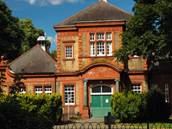 |
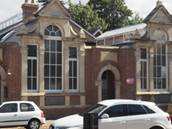 |
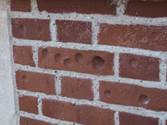 |
| Brentford Library | Swimming Baths | Coin marks in wall of the swimming baths carved while queueing. |
Entertainment
In the 1940s, and indeed into the 1950s, Britain was a vastly different place from the later years of the century. There was no television, no mobile phones (in fact few private phones at all in Brentford outside of businesses, even most shops didn’t have them). No social media, no computers, No Walkmans; gramophone records were 9 inches (23cms) in diameter, black, brittle and heavy, required a large bulky machine on which to play them, often mechanical, not electric, which needed winding up every 3 minutes, which was for how long one side of a record played. Records of the latest popular songs cost variously from 6d to 1/-. You also had to change the needle fairly often, too.Brentford had one cinema, or pictures, the Queens Hall at the Half Acre. It was a converted Victorian Church or community hall, commonly known as the ‘bug ‘utch’. It did not show the latest films! There were 3 different programmes a week, Monday to Wednesday, Thursday to Saturday with a different one on Sundays. To see the latest ‘releases’ one had to go to Ealing, Isleworth, Hounslow, Hammersmith or Richmond. Seat prices in the Queen’s Hall were 6d; 9d or 1/-. Elsewhere they were 1/3; 1/6 or 1/9; 2/3 or 2/9d. In the West End of London a seat in the circle could cost 10/6d.
In my Brentford there was no theatre, the nearest was the Q Theatre at Kew Bridge, the Chiswick Empire, a variety cum music hall, or Richmond theatre, which is still going.
Our main entertainment at home was the Wireless, or Radio. It was listened to avidly during the war for news although gradually, as the mood of the country lightened, the entertainment programme, initially the Force’s Programme, became the Light Programme which eventually morphed into Radio 2. Most programmes were ‘live’ from hotels or dance halls around the country. There were many dance bands and comedy shows, most of which had very large audiences and followings. Among the most popular was ITMA (It’s that Man Again) starring Tommy Handley, Housewives’ Choice, a record request programme; Music while you work; Worker’s Playtime, usually broadcast from a factory or work’s canteen; Dick Barton, Secret Agent; Mrs Dale’s Diary a daily ‘soap’ and countless others.
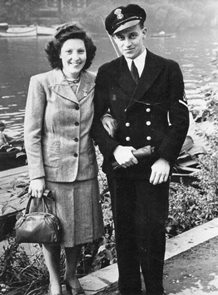 Outside the home, ballroom dancing was probably the most popular participatory sport or entertainment in the country, but Brentford didn’t have a ballroom or dance hall. My sister and her friends went regularly to their current favourites, the largest, probably in England outside of Blackpool, being the famous Hammersmith Palais. Dancing was THE marriage market in those days, where boy met girl. Most Town Halls and many church and village halls had weekly dances on a Saturday, always with a live band, not just a small group of musicians. My sister met her future husband on a blind date at the Red Lion in Hounslow High Street, a sailor based in the Alfa Romeo motor works in Isleworth which had been converted into a Royal Navy Motor Transport Depot for ‘the duration’.
Outside the home, ballroom dancing was probably the most popular participatory sport or entertainment in the country, but Brentford didn’t have a ballroom or dance hall. My sister and her friends went regularly to their current favourites, the largest, probably in England outside of Blackpool, being the famous Hammersmith Palais. Dancing was THE marriage market in those days, where boy met girl. Most Town Halls and many church and village halls had weekly dances on a Saturday, always with a live band, not just a small group of musicians. My sister met her future husband on a blind date at the Red Lion in Hounslow High Street, a sailor based in the Alfa Romeo motor works in Isleworth which had been converted into a Royal Navy Motor Transport Depot for ‘the duration’.
Football was very popular with even lower division teams attracting crowds of 20 or 30,000 people. Brentford had made history in the late 1930s in rising from the Third Division (South) to the First Division – the equivalent of the Premier League in three years - but sadly were relegated in 1946/7, but still played to virtually full grounds of over 30,000 people (and they all came by bus, train, bike or walked) to every home game. There were just a few seats, you stood, often in the open in the rain, although the Bees only had one uncovered enclosure – the Ealing Road end. Supporters were not segregated and there was seldom any crowd trouble. Small boys, like me, were often passed down to the front (sometimes overhead) and lifted over the railings to squat down with our backs against the fence, almost on the touch line. I later graduated to the ground staff at Griffin Park, initially as a programme seller but found myself overwhelmed by numbers, and latterly as Runner on the Player’s gate, taking messages from friends, hangers on, etc. to the dressing rooms. Over a period I met virtually all the great players of the era, Stanley Matthews, Tom Finney, ‘Gentleman’ John Charles, Tommy Lawton, Jimmy Hill, Raich Carter, Nat Lofthouse …….. and never thought to get an autograph! That would have been taking advantage, and I couldn’t do that.
The Hercules Roadster
In my last days at Ealing Road, my Uncle Bill gave me his bike. A huge, as it seemed to me, black, sit-up and beg Hercules Roadster with rod brakes, and no gears. I wobbled up and down the road with my friend Geoff Green clinging on to the saddle and my shoulder trying to keep me upright. Geoff could ride and wanted me to learn so we could go exploring. It took me several hours to learn until finally I made it. I could ride a bike. I was about 11.Immediately, I went indoors and told my Mum Geoff and I were going for a ride. ‘That’s alright dear’, she said, ‘be careful’. So off we set. At the bottom of Braemar road, perhaps 100 yards, turn right into Brook Road. ‘Signal with your right hand’ called Geoff and very gingerly I let go of the upright handlebar, stuck my arm out and went straight on, forgetting to turn the handlebars. We hadn’t done that in the training. Unfortunately, coming towards me at right angles was an elderly gentleman on his bike coming home from work. I forgot not only to turn but brake as well, something else we hadn’t practised. I hit him broadside on. He fell off backwards off his saddle, his front wheel was buckled and he was very very cross. ‘What have you done?’ he shouted at me. ‘I, er knocked you off’ I said, ‘I’m very sorry’. Geoff was laughing from the side of the road but I was quite frightened. I tried to explain I was new to bicycles but he didn’t listen. ‘You’ll pay for this’ he said picking himself and his bike up. ‘I know who you are and where you live’. I knew him and where he lived too, in Mafeking Avenue, just behind our road.
I was shaking and thought it better to go back home. My Dad had just come in from work as I got there with my sorry tale and as I was telling him what had happened there was a loud banging from the front door. There was my victim, still very cross who ranted straight off at my Dad, telling him he had to pay for the damage to him and his bike, that he was going to the police station to report me and what he wouldn’t do to me if he saw me on a bike again. Dad let him go on and then said, ‘you saw him coming, you could have avoided him, so clear off, do you understand?’
Collapse of stout party. Dad came in closed the door with a bang, the chap holding his buckled wheel still standing on the doorstep, we never heard another word about it. Dad told me to be more careful and that was that. I have never lost my love of cycling from that day to this and have covered tens of thousands of miles on a bike and made countless friendships that have lasted over 70 years.
TopA day on the Thames
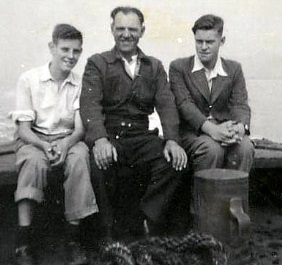 Mr Green, Geoff’s Dad, was a tug boat skipper on the Thames and on a number of occasions he took Geoff and me with him to work for the day. This meant getting up very early, around 5 a.m and travelling on early morning workmen’s buses and trains across London to ‘The Docks’ This was soon after the end of the war with the docks, much of the City and the suburbs in ruins and badly blitzed. But London was alive, the river was busy and very very interesting. We boarded the Robertsbridge, a relatively new (1936) electo-diesel boat, much more modern than the steam ‘Sun’ tugs that handled the big cargo ships from the Pool of London (the stretch between London Bridge and Tower Bridge) and the lower reaches of the river.
Mr Green, Geoff’s Dad, was a tug boat skipper on the Thames and on a number of occasions he took Geoff and me with him to work for the day. This meant getting up very early, around 5 a.m and travelling on early morning workmen’s buses and trains across London to ‘The Docks’ This was soon after the end of the war with the docks, much of the City and the suburbs in ruins and badly blitzed. But London was alive, the river was busy and very very interesting. We boarded the Robertsbridge, a relatively new (1936) electo-diesel boat, much more modern than the steam ‘Sun’ tugs that handled the big cargo ships from the Pool of London (the stretch between London Bridge and Tower Bridge) and the lower reaches of the river.
Our job was to pick up, tow and drop ‘lighters’ or barges to you. The account of a day on the Robertsbridge is another story. Suffice to say Geoff learnt a very great deal about the River Thames, currents, tides, cargoes, winds and work. Stan Green was a master skipper; his skill was fantastic, as was that of the many lightermen. Rough and ready they were among the most highly skilled men I have ever come across. They taught Geoff and me to swear, appreciate real bacon sandwiches, tea so strong the spoon stood up in it, and how cocoa is a super drink when you’re cold and tired. Fascinating days out. Not least was seeing the London policemen really did walk their beats in twos in China Town, Limehouse).
The Dawes three speed racer and the Holdsworth Hurricane
A year or two later when I decided I wanted a new bike, a ‘racer’ my Dad said I could have one. Great, I thought, but then he said ‘you’d better get a job, earn some money and buy one then. By the way, the papershop in the High Street need a new paperboy. Better get down there and see about it’. So I did, got the job at 9/- a week (seven days plus a collection round on Sunday mornings) saved my money and bought a new bike. The tale had a very happy ending in that when I had saved what I thought was enough, £17, I took Dad along to the shop and showed it to him. I had been in the shop ‘looking’ for weeks. Dad looked and said wouldn’t I prefer that one, pointing at one with three speed Sturmey Archer gear. Yes I would, I said but that one is £19 and I haven’t got that much money. ‘Well’ he said, ‘we’ll just have to see what we can do, won’t we?I came out with my new Dawes three speed racer. Dad had set it all up with the shop weeks before. I got a Chossy saddlebag as well, and have never looked back.
Thanks Dad, not only for the bike but the lesson as well.
5 years later I bought a hand built W F Holdsworth racing bike, made to measure, with a 5 speed Campagnolo and double clanger for £33/10/0 in bright orange. I rode it for 10 years before giving it to my nephew. He has still got it, rides it regularly as a training bike and recently spent over £2500 on a new bike on which he has completed the London Prudential 100 mile ride twice in his late 60s. It’s not as good as the Holdsworth Hurricane.
Wedding bells - for my sister
A few other things happened in Brentford towards the end of the war. My sister married her sailor from Croydon at St. Lawrence’s Church in the High Street, a few days after the first Atom bomb was dropped on Hiroshima. The wedding breakfast (remember them?) was held in the hall in Braemar Road belonging to the Princess Royal Pub, landlord Wally Bewley.
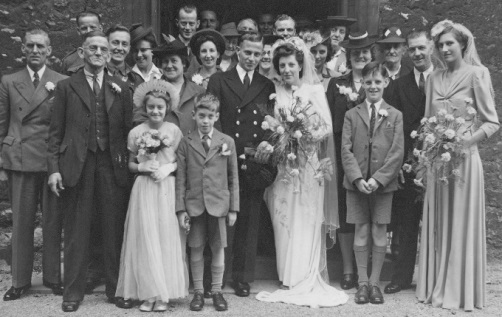 |
| My sister’s wedding 11 Aug 1945 Me second right, front row |
Mum and Dad
My Mum got a job as a seamstress in the sewing room of Percy House, an old people’s home attached to the West Middlesex Hospital where she spent many happy years. Dad resumed his career as a football referee. But for the outbreak of war in 1939 he apparently stood a good chance of becoming a Football League referee but by 1946 he was too old. He continued as a ref until the 1960s for the Chiswick & District Sunday Football league for many years and became its Chairman. Sunday football was not recognised by the FA for many years.Interestingly (to me) the groundsman at Chiswick County was a renowned CDSL footballer and one day asked me if I was related to George Burke, the referee. When I said he was my Dad he told me he was recognised as the best ref in the London area. Tough, knew all the tricks and dodges, stood no nonsense or backchat from any player and was scrupulously fair. He never had to send any one off and seldom ‘booked’ anyone, (there were no yellow cards then). Everyone liked to have him as a ref because it would always be an open game with very little whistle. Dad’s method of keeping the game flowing was to go into both changing rooms? before every game advising the players of his interpretation of the Laws of Football. No foul play. No underhand kicking, punching, shirt tugging on or off the ball. No abusive language. Foul language meant being sent straight off without warning. No cheating. No arguing or talking to him. He meant it and they knew it. If there was trouble brewing he would run alongside the miscreants and the captain, have a quiet, word in their ear, make it clear he was aware of what was going on and to stop it. They always did. It probably helped that they knew he was Chairman of the disciplinary committee and League.
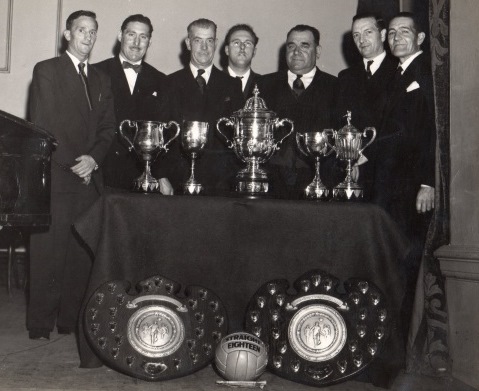 |
| My Dad (3rd from left) and t’ league committee’ |
Dad was been Branch Secretary of the Boilermaker’s Union, a role he held for many years. His books were immaculate and he could read a column of figures at a glance. .Meetings were held in the Bull Public House by St George’s church in the High Street.
Of my footballing career, I made my school debut on 26th October 1946; we beat Acton County (away) 2-1, but, when I got home with the good news, I found I had become an uncle as my sister had given birth to my nephew that morning. Now he has just turned seventy and become a grandfather, which I am not, I might just forgive him, but I would like my Holdsworth back.
TopSome names from the past
John BarterDavid Bell
Roy Collis
Peter Danby
Peter Davidson
Peter and John Eborn
Terry Fleming
Dennis Ford
Derek Green
Geoff Green
Kenny Lloyd
Terry Mariner
Maynard Martin
Johnny Muttitt whose Dad played for Brentford
Peter Parsons
Brian Radley
Alfie & David Sturgess
Eric ? (from Greet Road
Published December 2016